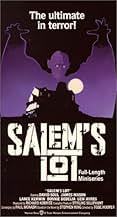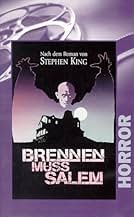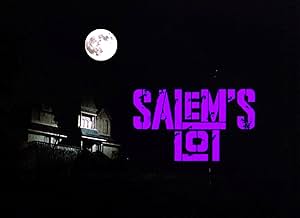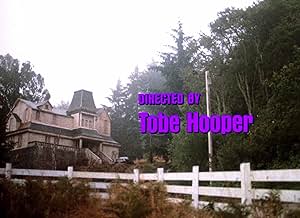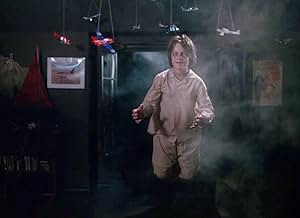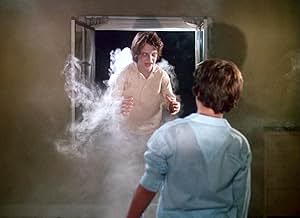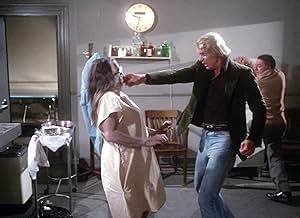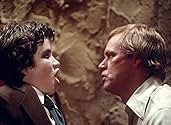Straker abre a sua loja de antiguidades em Salem''s Lot. Ao mesmo tempo, a cidade é atormentada por pessoas que se sentem doentes.Straker abre a sua loja de antiguidades em Salem''s Lot. Ao mesmo tempo, a cidade é atormentada por pessoas que se sentem doentes.Straker abre a sua loja de antiguidades em Salem''s Lot. Ao mesmo tempo, a cidade é atormentada por pessoas que se sentem doentes.
- Indicado para 3 Primetime Emmys
- 4 indicações no total
Explorar episódios
Avaliações em destaque
As it really is a wonderful and suspenseful vampire tale! Stephen King - not normally my favorite horror writer - has created one of the absolute BEST modern vampire tales in this story, and this mini-series translation is absolutely true to the feel of his tale! Instead of splatterfest effects , this show hinges itself on a high-tension spiderweb of plotlines and sets up the vampire more as a behind-the-scenes controlling evil. The terror here is not in seeing the monster, it is in NOT seeing him and knowing that he and his minions are out there, somewhere, plotting and planning with the heros stumbling blindly after them like toddlers in the dark. Give this show a chance! It may just scare you!
The story is pretty interesting and is build up well. The miniseries does an amazing job on building up the atmosphere when the vampires arrived. I really like how the vampirism spreads throughout the townsfolks. The creepiness factor really works well when the vampire shows up because it gives off a eerie vibe to it. And the climax is pretty suspenseful. There's a few flaws with this miniseries. One is that some scenes feels unnecessary and I didn't get the point of it. Also the main vampire doesn't appear a lot and only shows up 2 hours into the miniseries. While he doesn't appear a lot, he's definitely the scariest vampire I ever seen. He looks so freaky and is really threatening villain. The vampire makeup effects are really well made. I really like how the makeup looks so creepy with it's yellow eyes and Barlow blue face. The atmosphere is the best part of the movie. The miniseries does an amazing job building up the suspense to it and the vampire scenes are really effective to be creepy.
This is one of the most richly atmospheric films in horror, an article of pure latenight seduction and phosphorescent darkness.
Atmospheric not in the sense that a dry ice machine has pumped a catacomb full of haze and cobwebs are strategically placed in some dark corner, but as a place lived, with naturally dark corners and tangible portents: the old dark house on the hill breathing evil, the antique shop downtown, all velvety smell and musty colors, the small town lined with porticoes bathed in the quiet of a lazy night, yet harboring secrets and vice from inside. Prying eyes staring from behind a curtain.
Oh, at some point vampires come flying through the window, and it's still fine by me, it's one of the better vampire films and at 3 hours it's better fleshed than most of them; but I am just not attuned to the whole vampire lore so I leave this part to be enjoyed best by the traditional horror fan. It is actually one of the more potent retellings of the most familiar story in this field, I was pleasantly surprised to see that it was not quite Dracula but that older film with longer shadows, so I will not spoil the discovery for you.
But the first part intrigues me in stranger ways, more suggestive, with menace that goes unspoken. The small-town facade that would later resurface in Twin Peaks.
There is a notion that matters in all this, but which is not pursued at all; the writer who feels from his perspective that it was his presence that awakened evil, it's fitting that it's coming from a writer because it's a self-centered, imaginative notion, but which from our end we know is bogus. Evil was already afoot, and was never centered around him. But he wistfully imagines himself at the center so he can write about it.
So I don't know what happened with Tobe Hooper. He was never very elegant with a camera, the way Argento was or occasionally Carpenter, but he was unmatched in his feel for the aural qualities of film. He could make a room hum with evil. My guess is that, being an intuitive maker, the feel came and went, or he forgot how to tap into it (you can see as early as Eaten Alive how he seems to be desperately trying to capture again the muse that gave him Texas Massacre). Or he plainly stopped actively chasing after the right material.
This was just right for him. Only Kubrick has better adapted Stephen King to my mind.
Atmospheric not in the sense that a dry ice machine has pumped a catacomb full of haze and cobwebs are strategically placed in some dark corner, but as a place lived, with naturally dark corners and tangible portents: the old dark house on the hill breathing evil, the antique shop downtown, all velvety smell and musty colors, the small town lined with porticoes bathed in the quiet of a lazy night, yet harboring secrets and vice from inside. Prying eyes staring from behind a curtain.
Oh, at some point vampires come flying through the window, and it's still fine by me, it's one of the better vampire films and at 3 hours it's better fleshed than most of them; but I am just not attuned to the whole vampire lore so I leave this part to be enjoyed best by the traditional horror fan. It is actually one of the more potent retellings of the most familiar story in this field, I was pleasantly surprised to see that it was not quite Dracula but that older film with longer shadows, so I will not spoil the discovery for you.
But the first part intrigues me in stranger ways, more suggestive, with menace that goes unspoken. The small-town facade that would later resurface in Twin Peaks.
There is a notion that matters in all this, but which is not pursued at all; the writer who feels from his perspective that it was his presence that awakened evil, it's fitting that it's coming from a writer because it's a self-centered, imaginative notion, but which from our end we know is bogus. Evil was already afoot, and was never centered around him. But he wistfully imagines himself at the center so he can write about it.
So I don't know what happened with Tobe Hooper. He was never very elegant with a camera, the way Argento was or occasionally Carpenter, but he was unmatched in his feel for the aural qualities of film. He could make a room hum with evil. My guess is that, being an intuitive maker, the feel came and went, or he forgot how to tap into it (you can see as early as Eaten Alive how he seems to be desperately trying to capture again the muse that gave him Texas Massacre). Or he plainly stopped actively chasing after the right material.
This was just right for him. Only Kubrick has better adapted Stephen King to my mind.
I was fourteen years old when this film was released, and it was really a shocker for its time. Although I can see the points raised by detractors of this film, nevertheless, it is, in my opinion, one of the most truly terrifying movies I have ever seen. The scenes in which first Ralphie and then Danny Glick appear in windows at night, scratching to be let in, were utterly horrifying, as were the scenes with Mike Ryerson in Jason Burke's guest bedroom ("Looooook at me ... I will see you sleep like the dead, teacher") and Marjorie Glick in the mortuary. Along with the original "Halloween," this is a film that really, really scared me, and I feel that a key element was the lack of gore (which is probably a disappointment to younger viewers used to explicit splatter). The nonverbal dialogue of expressions and actions, the music, and the significantly occurring silences resulted in the suspense which makes a film truly frightening in my opinion.
Having said this, I do feel that the book was much, much better than the movie, and I would recommend it as one of the best vampire stories ever written (sorry, Anne Rice, but it's true). But let's be fair and realistic. It's a rare film that excels the book on which it was based. Not one of Stephen King's wonderfully (and horribly) imaginative works has EVER been committed to film in a way that has equaled the written work. Never, ever, EVER. That is something that will just never happen. If it were possible, then nobody would bother to read his books, he would become a screenwriter, and that would be a real loss for the horror genre.
Having said this, I do feel that the book was much, much better than the movie, and I would recommend it as one of the best vampire stories ever written (sorry, Anne Rice, but it's true). But let's be fair and realistic. It's a rare film that excels the book on which it was based. Not one of Stephen King's wonderfully (and horribly) imaginative works has EVER been committed to film in a way that has equaled the written work. Never, ever, EVER. That is something that will just never happen. If it were possible, then nobody would bother to read his books, he would become a screenwriter, and that would be a real loss for the horror genre.
This movie is not for those people who want to watch busty teenager chicks get slashed and stabbed to death by tall guys with hockey masks and machetes. For that kind of elevated thrill, rent "Summer Camp 5" or something. But for those of you who want a horror movie worthy of the name, rent "Salem's Lot:the mini series". This series scared the hell out of me when I was younger, and very little has changed. David Soul gives the performance of his career as writer Ben Mears and absolutely becomes the character. James Mason is genuinely chilling as Straker, the humorous but not quite well intentioned antiques salesman and, uh...'partner' of Mr. Barlow, aka Nosferatu. I've never seen a horror movie that builds up an atmosphere of suspense and fear as effectively as this one does. It is true that King didn't like it, and as far as I'm concerned that's more to its credit--let's remember that this is the guy behind that illustrious cinematic masterpiece "Maximum Overdrive". The book is one more trashy vampire novel among many, as forgettable as it is trite. Hooper transforms King's boring,oh-it's-just-Dracula-again run of the mill vampire into a mysterious, terrifying monster in the tradition of authentic horror. Don't just watch it, buy it. A necessity.
Stephen King Movies Ranked by IMDb Rating
Stephen King Movies Ranked by IMDb Rating
See how IMDb users rank the feature films based on the work of Stephen King.
Você sabia?
- CuriosidadesThe exterior for the Marsten House was actually a full-scale facade built upon a smaller pre-existing hill-top house. In total, the facade cost the production an estimated $100,000 dollars to build. In 1979, an entire house (including the interiors) could have been made for that amount.
- Erros de gravaçãoWhen the younger Glick brother is abducted (and later presumably murdered by Barlow) he's wearing a jacket, t-shirt, dungarees and sneakers. After which, he appears to his brother wearing pajamas.
- Cenas durante ou pós-créditosThe text of the opening credits appear and dissolve piece by piece into each other in a jigsaw puzzle fashion.
- Versões alternativasSalem's Lot originally aired as a two-night mini-series with the first episode airing on 17 November 1979 and the second episode airing the following week on 24 November 1979.
Principais escolhas
Faça login para avaliar e ver a lista de recomendações personalizadas
Detalhes
- Data de lançamento
- País de origem
- Idioma
- Também conhecido como
- A Mansão Marsten
- Locações de filme
- 850 Bluff Street, Ferndale, Califórnia, EUA(Marsten House)
- Empresa de produção
- Consulte mais créditos da empresa na IMDbPro
Contribua para esta página
Sugerir uma alteração ou adicionar conteúdo ausente


